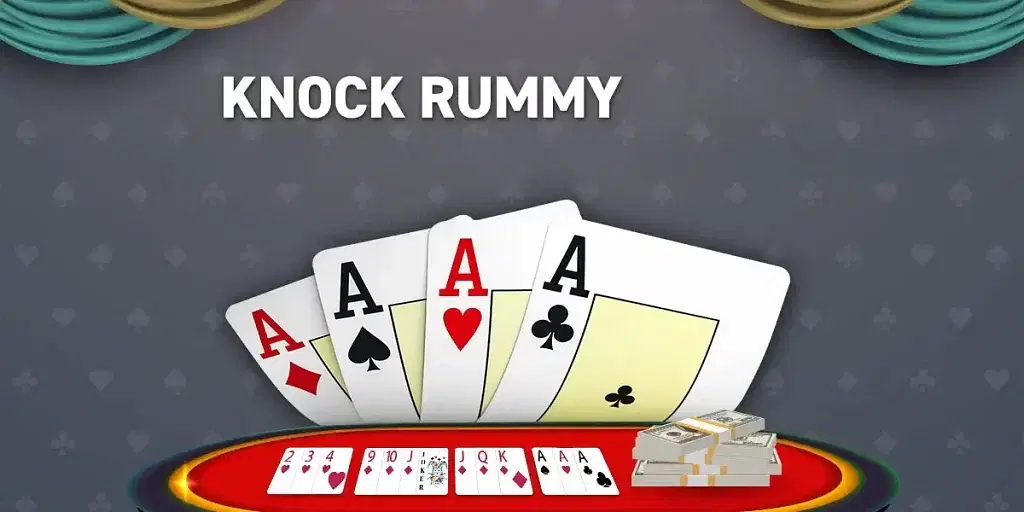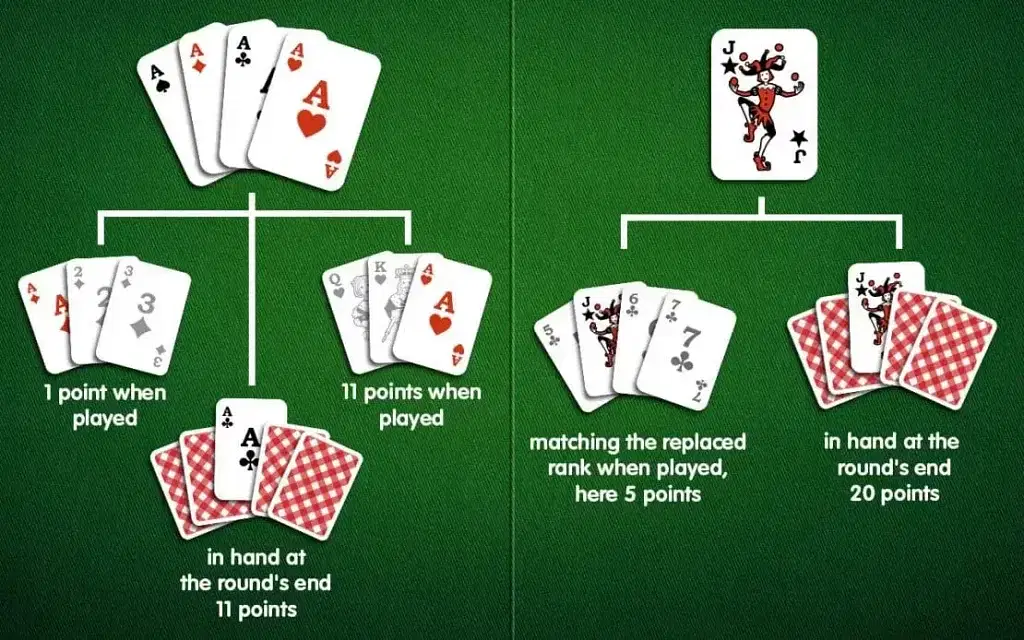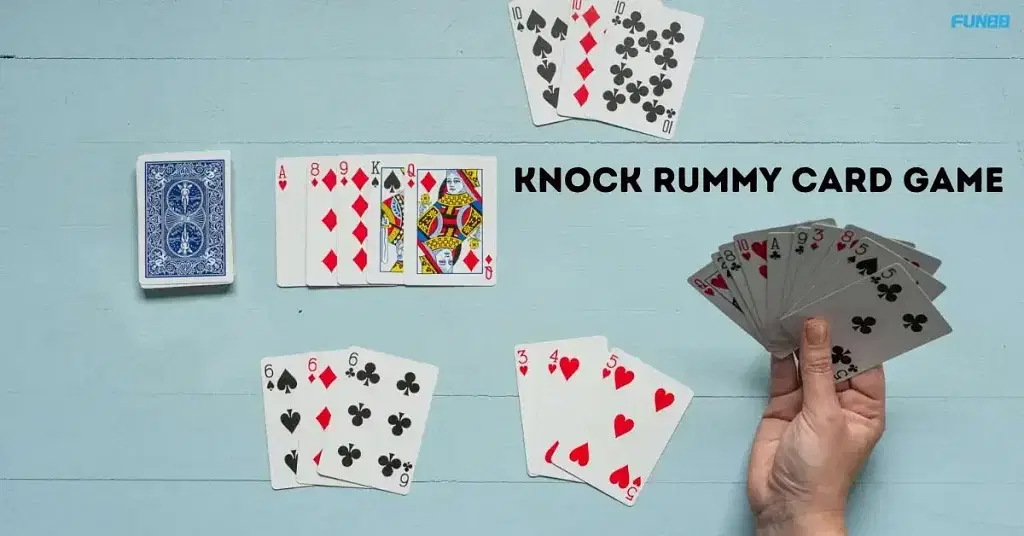The sound of shuffling cards, the anticipation before the draw—nothing quite matches the allure of a classic card game. In India, where card games have always held a special place in our hearts and homes, the Knock Rummy Card Game stands out as a beloved favourite.
Rich with strategy, a dash of luck, and plenty of social interaction, it has captivated players across generations. Whether you’re whipping out a deck during a festive get-together or logging into one of the exciting online cash games platforms, Rummy game never fails to deliver the thrill.
In this post, we will journey through the ins and outs of this fascinating game. From its basic rules to nuanced strategies, you’ll find everything you need to elevate your Knock Rummy skills.
What is Knock Rummy?

Knock Rummy is a variant of the age-old classic Rummy, with a unique twist that adds layers of strategic complexity. Typically played with two to five players, it’s designed for those who enjoy both mental challenges and social play. The essential premise remains the same as other Rummy games: create valid sets and sequences with your cards. But here’s the twist—players can end a round anytime by “knocking,” adding a unique strategic dimension.
The objective is to reduce the total value of unmatched cards (known as “deadwood”) in your hand, all while building strong sets or sequences. But, unlike Gin Rummy, where perfection is needed to declare a victory, the Rummy game online offers players the chance to end the round early if they foresee a winning outcome. It’s this opportunity for spontaneous insight that keeps players engaged.
The game progresses as each player takes turns drawing and discarding cards to improve their hand. Yet, the decision-making process is anything but straightforward.
Players must constantly weigh the potential benefits of knocking against the risks of what their opponents might be holding. Here’s where Knock Rummy tests not just memory and observational skills but also the ability to anticipate and outmanoeuvre competitors.
Objective of Knock Rummy
- Create Sets and Sequences: Group cards in either sets (same rank, different suits) or sequences (consecutive ranks, same suit).
- Minimise Deadwood: Lower the value of your unmatched cards. This is crucial for winning, as lower deadwood means higher chances of success.
- Strategic Knocking: Choose the right moment to knock, believing your hand is stronger at minimising deadwood than your opponents’.
- Lay Off Opportunities: After knocking, opponents can reduce their deadwood by adding cards to the knocker’s melds. Have the foresight to mitigate this potential advantage for others.
These objectives shape the way you play each round and refine your overall approach to the game. Whether engaging with friends in a relaxed setting or participating in competitive formats, understanding and embracing these objectives paves the way for both enjoyment and success.
Related Read: Rummy Game Rules
How to Play Knock Rummy

Embarking on a Rummy game online is an exciting adventure that blends strategy with a bit of chance. Whether you’re a newcomer or just need a refresher, this step-by-step guide will help you grasp the essentials and get you ready to enjoy the game to the fullest.
Step 1: Setting Up the Game
The journey starts with the right setup. Knock Rummy is typically played with two to five players using a standard 52-card deck. The initial step requires a good shuffle of the deck to ensure randomness, as this adds fair unpredictability to the game. Each player is then dealt 10 cards, face down. The remaining deck is placed at the centre to create the stockpile, with the top card turned face-up to kickstart the discard pile.
Step 2: Understanding Your Hand
Now that you’ve got your cards, take a moment to understand what you’re dealing with. Your goal is to create sets and sequences. A set consists of three or four cards of the same rank, while a sequence requires three or more consecutive cards of the same suit. Having a clear idea of your starting hand’s potential lays the groundwork for your strategy moving forward.
Step 3: The Gameplay Cycle
Once the setup is complete and your cards are understood, the gameplay cycle begins:
- Drawing a Card: The player to the dealer’s left starts by drawing one card. You can choose either the top card from the stockpile or the face-up card from the discard pile. This decision can be strategic, depending on your hand’s needs and the cards you suspect your opponents might be collecting.
- Forming Melds: As you draw, you’ll aim to improve your hand by forming melds (sets or sequences). The heart of Knock Rummy lies here—anticipate potential draws and discards to form the best possible hand.
- Discarding a Card: After drawing, you must discard one card to the top of the discard pile, keeping your hand at 10 cards. This is another strategic move where you aim to rid your hand of high-value deadwood or cards that could potentially aid your opponents.
Step 4: Knocking
At any point during your turn, if you believe your hand has achieved a strategically low deadwood value, you can choose to “knock.” Knocking signals the end of that round. To knock, lay down all your cards, organise them into melds and reveal your remaining deadwood cards.
Step 5: Scoring and Lay Offs
Once a player knocks, it’s time to reveal and assess the hands:
- Calculating Deadwood: Each player calculates the total deadwood value in their hand. Face cards are worth 10 points, aces are 1 point, and number cards correspond to their face value.
- Laying Off: Before finalising the scores, other players can attempt to reduce their deadwood by laying off unmatched cards onto the knocking player’s melds. This adds another layer of complexity, as players must quickly analyse opportunities to reduce their scores, ensuring that every knock brings a unique challenge.
Step 6: Declaring the Round Winner
The player with the lowest deadwood value wins the round, and points are calculated based on the difference between their deadwood and those of other players. Achieving an even lower deadwood value than the knocker earns additional bonus points, adding excitement and reward for strategic play.
Step 7: Continuing the Game
Knock Rummy is typically played over multiple rounds, with the winner being the first to reach a set score, like 100 or 150 points. This ongoing competition keeps the game engaging as players refine their strategies with each round, analysing what works and what doesn’t to emerge victorious over several games.
Check out for More Details : How to Play Rummy Card Game
Tips to Win Knock Rummy
Winning at Knock Rummy card game goes beyond simple luck—it involves strategic thinking and a keen understanding of the game’s nuances.
Here are some actionable tips to tilt the odds in your favour:
- Prioritise Early Melds: Forming sets and sequences as early as possible is crucial. It reduces your deadwood and gives you more flexibility with your drawing cards. Keep an eye on potential melds when you first receive your hand.
- Observe and Adapt: Pay close attention to the cards your opponents are picking from the discard pile. This can help you guess which cards they are collecting, allowing you to adjust your strategy accordingly, perhaps even holding onto cards they might need.
- Discard High-Value Deadwood: Make it a habit to get rid of high-point cards early unless they’re part of a potential meld. High cards are risky to keep if you’re forced to knock unexpectedly.
- Flexible Knocking: Don’t rush to knock unless you’re sure. Be patient, but don’t wait too long either, especially if you suspect an opponent is close to forming a strong hand.
- Consider the Stockpile: Near the end of the stockpile, reevaluate your cards. If the stock is likely to run out, you might want to knock early, if possible, to prevent opponents from finishing strong.
Strategies for Knock Rummy
Developing a winning strategy in Knock Rummy involves more than just understanding the basic rules—it’s about mastering the game’s ebb and flow.
Here’s a closer look at strategic approaches:
- Defensive Discards: Train yourself to discard cards that are less likely to help your opponents. If they’re avoiding hearts, perhaps that seven of hearts is a good card to let go. This aspect requires observing opponents closely.
- Controlled Risks: Sometimes, taking calculated risks can pay off. Holding onto a high card for one or two rounds, hoping to complete a sequence, can sometimes turn the tide if the right card comes.
- Master the Knock Timing: The crux of Knock Rummy is knowing when to knock. The balance comes from knowing your own hand’s limits and watching your opponent’s draws and discards to estimate their progress.
- Blocking Strategies: If you suspect an opponent is forming a specific sequence, and you don’t need a particular card, you might consider holding it just to block them, especially if it doesn’t directly harm your own potential hand.
- Learn from Every Round: Winning strategies evolve with experience. After each round, review what could have been done differently. Were there missed opportunities to knock, or did you hold onto deadwood for too long?
Variations of Knock Rummy
Knock Rummy offers versatility not just in play but through its intriguing variations, each adding a unique twist to the game:
- Straight Knock Rummy: In this variation, players cannot lay off cards when someone knocks. This increases the need for precision in forming your hand since you can’t improve your hand once knocking happens.
- Hollywood Rummy: Here, players keep track of their overall scores across multiple games or “movies,” adding their scores across three games before determining an ultimate winner. This introduces a level of sustained strategy where each game impacts your cumulative position.
- Oklahoma Rummy: Played just like Knock Rummy, but the value of the initial up-card from the stockpile sets the minimum point value needed to knock. This variation emphasises adaptability and adds an extra layer of challenge, as players must frequently reassess their hands in light of changing knocking thresholds.
Online Knock Rummy vs Traditional Knock Rummy
To appreciate the full spectrum of Knock Rummy, let’s compare the traditional game with its modern online counterpart. Each format offers a distinct experience, catering to different player preferences:
| Feature | Traditional Knock Rummy | Online Knock Rummy |
| Setup and Accessibility | Requires a physical deck and gathering of players | Easily accessible from computers or mobile devices |
| Player Interaction | Face-to-face interaction, encouraging social engagement | Virtual interaction, often with a global community |
| Game Pacing | Depends on players’ speed and interaction | Typically faster-paced with automated processes |
| Scoring and Records | Manual scorekeeping | Automatic scoring and tracking of statistics |
| Competitions | Limited to local circles | Opportunities for tournaments and online cash games |
Both versions offer unique appeals. While traditional provides the charm of personal interaction, the online version caters to convenience and broader connectivity.
Also Read : Rummy Strategies
Why Knock Rummy is Popular?
The enduring popularity of Knock Rummy can be attributed to several key factors:
- Engagement and Strategy: It’s a game that keeps players hooked with its blend of tactical depth and spontaneity. Every hand is a mix of calculated decisions and intuitive guesses.
- Cultural Significance: Rummy variants, including Knock Rummy, have deep roots in Indian culture. They are frequently played at family gatherings, festivals, and social events.
- Flexibility for Players: The game’s adaptability to both casual play and competitive environments, particularly in online cash games, makes it appealing to a wide range of players.
- Variety and Innovation: With so many variations, players never grow bored. Whether it’s adding new rules or playing with different scoring methods, the possibilities seem endless.
Frequently Asked Questions (FAQs)
Both Knock Rummy and Gin Rummy are variations of the classic Rummy game, yet they have distinct rules which affect playstyle:
Strategic Depth: The immediacy of potential knocking adds a tactical layer to Knock Rummy, as players must continually weigh their hand’s potential.
Knocking: In Knock Rummy, players can knock when their deadwood is deemed low enough, ending the round prematurely. In contrast, Gin Rummy requires a perfect hand to call “gin” and end the round.
Gameplay Pace: Knock Rummy tends to be faster, given the availability of knocking, whereas Gin Rummy may take longer as players wait for their perfect hand combination.
Absolutely! Knock Rummy is widely available online across various platforms. Playing online offers numerous benefits:
Community Interaction: Online platforms connect you with global players, offering new challenges and friendships.
Convenience: Enjoy the game anywhere, anytime, with an internet connection. There is no need to gather friends physically—just log in and begin.
To excel at Knock Rummy, consider these strategic insights:
Awareness: Monitor what opponents are drawing and discarding to anticipate their potential strategies and adapt your plays accordingly.
Adaptability: Constantly adjust strategies based on your hand and observed player patterns. Flexibility is key.
Risk Management: Balance taking risks with safeguarding your hand. Sometimes, holding onto a potential card is worthwhile, but unnecessary risks should be avoided.
Star it if you find it helpful.

